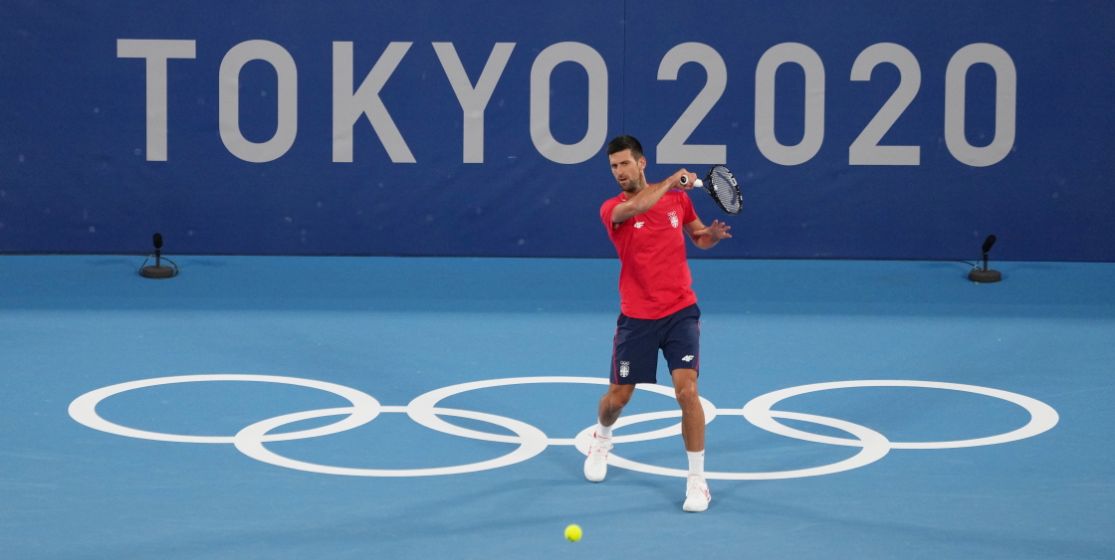In the eternal debate about who is the “greatest player of all time”, which resurfaces almost on a daily basis, Andre Agassi never gets a mention. Naturally, for although ranked among the giants of tennis, he never achieved the heights proudly conquered by Rafael Nadal, Roger Federer and Novak Djokovic. But he is the only one to have climbed a different mountain. No one in history apart from him has won all of tennis’s most important titles: the Majors, the Masters, the Davis Cup and the Olympics. And now that record could be equalled by Djokovic – temporarily coached by Agassi from May 2017 to March 2018 – on 1 August in Tokyo.
Whereas Nadal – who has announced his plan to return to competition in Washington on 2 August – has never been able to bag the ATP Finals trophy, Federer and Djokovic have always failed in their quest for an Olympic singles gold medal. When Federer chose to pull out due to “a setback with my knee during the grass-court season”, Djokovic became the only man who could hope to match the feat achieved by “Dédé”. And if he does, the Serb superstar could continue chasing his wife, Steffie Graf – the only person in history who can boast a Calendar Year Golden Slam (winning all four Grand Slams and an Olympic gold medal in the same year) thanks to her unrivalled season in 1988.
“If somebody can win a Golden Slam, it’s Novak”
“Like I say so many times, even before I was in his team, if somebody can win a Golden Slam, that’s Novak,” said Goran Ivanišević, co-coach of the world number 1, after his protégé's triumph at Wimbledon. “He has a lot of confidence. For the first time in his career, he has won the first three Grand Slam tournaments of the year. (...) He is getting stronger and stronger. Even when he's not playing at his best, he wins. So imagine when he's at his best… He's unbeatable. For an opponent, I think it’s impossible to even imagine that you can beat him when he's playing his best tennis.”
Since he first joined the circuit, the Belgrade native has taken part three times in the most important sporting event on the planet. In 2008 and 2012, he lost in the semi-final against the eventual winners: Rafael Nadal and Andy Murray. Although he took away a bronze from Beijing, Juan Martin del Potro deprived him of that honour in London. Four years later, in Rio de Janeiro, the same del Potro swapped his racket for Thor’s hammer, as he often does, and knocked him out in the first round. His dreams in tatters, crushed by the Argentinian's power, “Djoker” left the court in tears. Representing his country at the Olympic Games has always held a special place in his heart.
Dry the tears from Rio
“It's one of the toughest losses in my life and career,” he confided at a press conference. “It’s not easy to handle, especially now, just after the wounds are still fresh. It’s not the first or the last time I am losing a tennis match. But the Olympic Games... Yeah, it’s completely different.” In the wake of his recent triumph in London, giving him a 20th Grand Slam trophy to equal Nadal and Federer, Djokovic expressed doubts to journalists about his trip to Japan, due to the announcement during Wimbledon fortnight that Olympic events were to take place behind closed doors, combined with strict Japanese lockdown restrictions.
“That was really disappointing to hear (that Olympic events were to take place behind closed doors),” he explained. “I also hear that there's going to be a lot of restrictions within the (Olympic) Village. Possibly you would not be able to see other athletes perform live. I can't even have my stringer, that is very important part of my team. I'm limited with the amount of people I can take in my team as well. Right now, I'm a little bit divided. It's kind of 50/50 (whether he will take part or not).” If the scales have finally tipped in favour of taking part, it is out of love for his homeland as well as the desire to add a line to a list of awards that is already as long as the arm of a sporting titan.
“People will remember the medallists, not the closed doors”
“I made this decision out of patriotism and love for Serbia,” he told Montenegrin news agency MINA before setting off for Tokyo. “I am not overjoyed about playing with no fans present or about the various coronavirus restrictions effective in Japan. (...) I came across Blanka Vlašić (Croatian high jump champion, Olympic silver and bronze medallist) and she said that people would only remember who won the medals, not what the conditions were like or whether there were any fans or not. Her words stuck with me, and I am delighted that I decided to take part in the Olympics. I am inspired to play my best tennis and confident that I can win the gold medal.”
Time will no doubt struggle to erase the sad spectacle of empty stands and the echo of empty stadiums. History still remembers the boycott by the Americans of the Moscow Olympic Games in 1980 for example. But in terms of performance, winning gold would certainly boost the stats in Novak Djokovic's favour when it comes to debating who is the G.O.A.T. Will that be enough to close the subject? No. Firstly, because the three-headed monster remains intact. As long as the three rivals continue to play, the competition and the verbal jousting will continue. Secondly, because the judgement will remain subjective. As Ivanišević pointed out, “It’s also a matter of personal preference, of style of play. For me, Novak is already the greatest. But some prefer Nadal, others Federer. Some people will argue for another player entirely (Laver, Borg…).”























